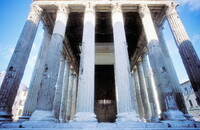| dc.coverage.spatial | Site: Vienne, Rhône-Alpes, France | en_US |
| dc.coverage.temporal | 25 BCE (creation) | en_US |
| dc.creator | unknown (Roman (ancient)) | en_US |
| dc.date | -25 | en_US |
| dc.date.accessioned | 2013-02-25T17:50:05Z | |
| dc.date.available | 2013-02-25T17:50:05Z | |
| dc.date.issued | -25 | en_US |
| dc.identifier | 196015 | en_US |
| dc.identifier.other | archrefid: 1529 | en_US |
| dc.identifier.uri | http://hdl.handle.net/1721.3/103523 | |
| dc.description | Frontal view. The structure is supported by Corinthian columns; Best preserved of Vienne's numerous Roman monuments is the Temple of Augustus and Livia surviving nearly intact in the Place du Palais along the Rue des Clercs. Almost the twin of the Maison Carrée in Nîmes, it was originally dedicated to Augustus at the end of the 1st century BCE, then again dedicated in AD 41 to Livia, Augustus' wife, by her grandson, the Emperor Claudius. | en_US |
| dc.format.medium | stone | en_US |
| dc.rights | © Scott Gilchrist, Archivision, Inc. | en_US |
| dc.subject | architectural exteriors | en_US |
| dc.subject | rulers and leaders | en_US |
| dc.subject | Augustus, Emperor of Rome, 63 B.C.-14 A.D. | en_US |
| dc.subject | Imperial (Roman) | en_US |
| dc.title | Temple of Augustus and Livia | en_US |
| dc.type | image | en_US |
| dc.rights.access | Licensed for educational and research use by the MIT community only | en_US |
| dc.identifier.vendorcode | 1A3-R-F-VTA-A2 | en_US |
| vra.culturalContext | Ancient Roman | en_US |
| vra.technique | construction (assembling) carving (processes) | en_US |
| vra.worktype | temple | en_US |
| dc.contributor.display | unknown (Roman (ancient)) | en_US |


